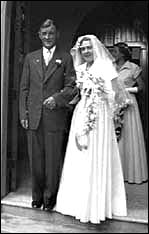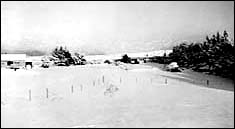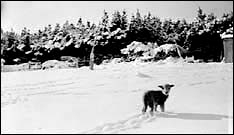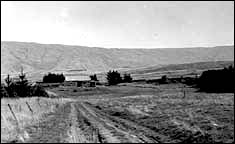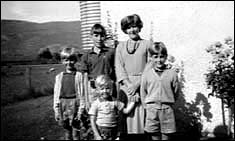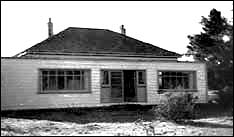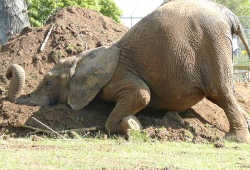Article and photos by Verna Morris – 19/01/01
A Farmer’s Wife Looks Back On Life In Central Otago In The 1950s And 1960s
I was a schoolgirl when I first visited the Maniototo district in Central Otago to stay on an uncle’s farm at Teviot. We visited neighbours three or four miles further on at Kirribilli, one of several Rehab farms balloted after the war. It had been part of the old Teviot Run which was subdivided for farms for Returned Servicemen after World War 1.
Teaching and marriage Ten years later I was teaching at Ettrick school across the Clutha River
|
|
| Verna and Frank Morris on their wedding day |
from Teviot. I met Frank Morris at a local Plunket ball, there was an instant rapport, and six months later we were married.
Frank was a returned soldier who had been wounded and captured in Crete and held as a prisoner of war for four years. He had many stories to tell over the years. He was twenty years my senior and did not know what he was taking on when he married me, but he supported me through it all.
The farm From city girl to a 1950s back blocks pioneer – it was quite a learning experience.
I settled on the same farm I had visited – Kirribilli. It was a farm of over 4000 acres of tussock country carrying sheep and cattle with some cultivation for winter feed. There were 2200 acres in the homestead block, and 2000 acres of summer country.
The farmhouse was 1600 feet above sea level, so was above the snow line which was at about 1200 feet, and we would have two to three weeks snowed in each winter. The high paddock was at 2000 ft and the sheep would have to moved out of it by Anzac Day (25 April).
|
|
|
| The farm under snow | |
The house was built of huts put together. It was sunny and comfortable, but there was no electricity at first. At night we used kerosene lamps and candles.
|
|
| The farm setting |
Combatting the cold temperatures This was an area with extremely heavy frosts. When I was boarding with a family on an orchard before I was married I had a bedroom on the cold side of the house. On frosty nights I wore pyjamas, a pullover, socks, gloves and a hat and wrapped another jersey around my rump. I had a hot water bottle. When I woke in the morning the sheet was frozen stiff where I had breathed on it in the night.
The washhouse on the farm was a lean-to outside the back door, and had a copper and tubs. On frosty winter mornings the washing would have frozen on the line before I put the second peg in. Even the eggs in the nest froze and their shells cracked.
When the frosts were heavy the orchardists lit frost pots to reduce the damage to the fruit. The air was thick with the smoke. From our farm which was above the valley we could see the smoke drifting down the valley from the apple and stone fruit orchards, first from Roxburgh and then about two hours later from Alexandra down the Roxburgh Valley. Windows had to be kept shut.
Our house was heated by the coal range, open fire and an early model closed-door burner. The water was heated by the coal range and we would bank up the fire before going to bed and have plenty of hot water in the morning.
The wood and coal supply was plentiful. The coal came from the Roxburgh Hydro which had its own coal mine. It wasn’t shiny coal. It was fairly dull and it was cheap and we could get it by the truckload. Some of our wood came from pine trees on the farm, and the rest was bought locally.
My role as farmer’s wife and mother of four sons I loved life on the farm though I was not the best cook and had to cope with an old Shacklock coal range. My days were filled with food and then babies as well. Having my husband and a farm worker to feed and having four sons over the next seven years kept me very busy. Shopping was usually done only once a week or fortnight when the mail was collected at the foot of the hill, so we got used to eating stale bread.
|
|
| Verna and her four sons |
My first effort cutting hair resulted in Frank driving eleven miles to the barber in Roxburgh for some repair work. However, he didn’t give up on me and for the next forty five years I was the family hairdresser with the number of my clients reducing as the boys became fashion conscious in their teens when we had moved to Akaroa and Christchurch, near to hairdressers.
Power plant There was great excitement when Frank bought a secondhand power plant and installed it. It ran only the lights and was supposed to be controlled by a button indoors, but this system failed many times and after reading in bed Frank would often have to get up and go to the shed outside to turn the power off for the night.
Septic tank Another pleasing development was when the septic tank was installed. It was a great novelty to pull a chain instead of having a long drop toilet.
The luxury of electricity The arrival of electric power at our house made life much easier. It greatly improved our knowledge of what was happening outside the world of the farm as we were then able to have a radio. A washing machine and a refrigerator were luxuries which made the life of the housewife much easier.
Phone and power lines The phone was a party line which closed at midnight from Monday to Saturday and at 8 p.m. on Sundays. If the phone line was knocked down by a storm or by a cattle beast Frank had to walk to the neighbour about three miles across steep county and find and fix the fault. If he had done this and was unable to fix it only then was he allowed to contact the authorities to fix it. Later the same arrangement applied to the power lines once we had electricity laid on. However the power was reasonably priced and for an annual rate we had an unlimited supply.
Water supplies We had to be careful about our use of water as the supply was from an underground creek above the house which was fed into the tank and gravitated to the house. A further tank caught rain water from the roof. Later a large concrete holding tank was built in the sheep yards and collected water from the woolshed roof.
Frank had a lake made on the farm and bought an old fire engine to use for irrigation. A top dressing pilot flew over the area and nearly crashed when he suddenly spotted a fire engine in the middle of nowhere.
Shearing Shearing meant a busy three weeks for me. Looking after two shearers, the shed hand, the farm worker, my husband and the growing family left little time for sitting down. I cooked breakfast, cut lunches, did the school transport, made scones for morning tea, prepared lunch with cold meat, potatoes and salad, and afternoon tea with home baking, and served a cooked evening meal. All this was dependent on fine weather.
Shearing was changed from machine to hand held blades which was a much longer process, but left a short coat on the sheep for protection. This meant a nice quiet atmosphere in the woolshed. We were able to hire experienced blade shearers who stayed in the cottage on the farm.
Education for the boys Our eldest son began school with correspondence. In spite of being trained as both a kindergarten and primary school teacher, I found it too difficult to juggle looking after the two men working and two pre-schoolers with quality time for teaching, so we began driving round the top road three and a half miles to a neighbour, picking up the two children there and driving another two miles to meet the school taxi which took them to Roxburgh.
|
|
| The house at Millers Flat |
This trip had to be made as far as the neighbour’s property again in the afternoon.
Later we put a married couple in the farm house and moved to a fifty acre property within three miles of Millers Flat which meant that the boys could go to school by bus.
We put in irrigation and grew lucerne on the second farm to feed the sheep on the main farm.
Ups and downs, laughter and anxiety Frank and I shared the same sense of humour and there were lots of laughs – and many incidents not so humorous in our life in the backblocks.
Read Verna’s article in NZine next week for her account of the ups and downs, laughter and anxiety on the back blocks farm.

